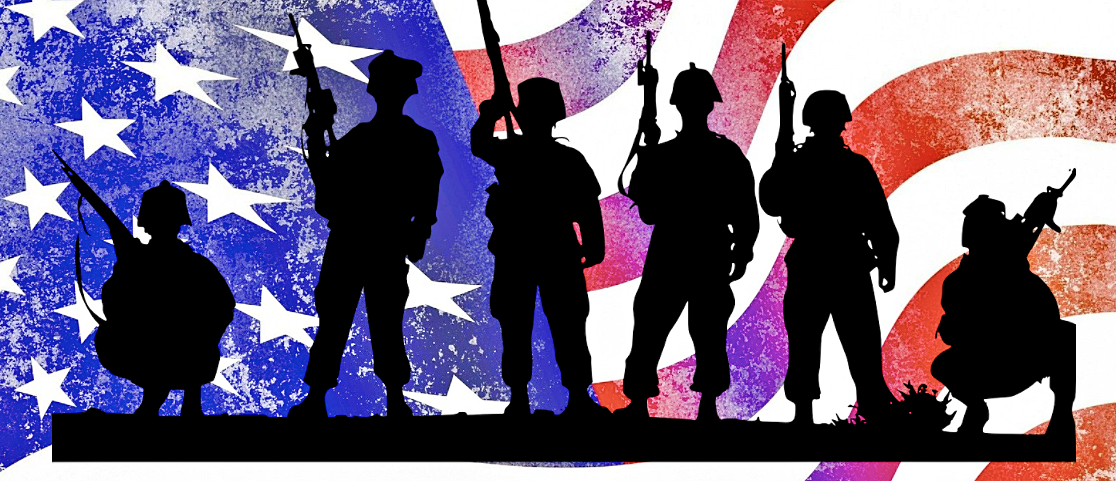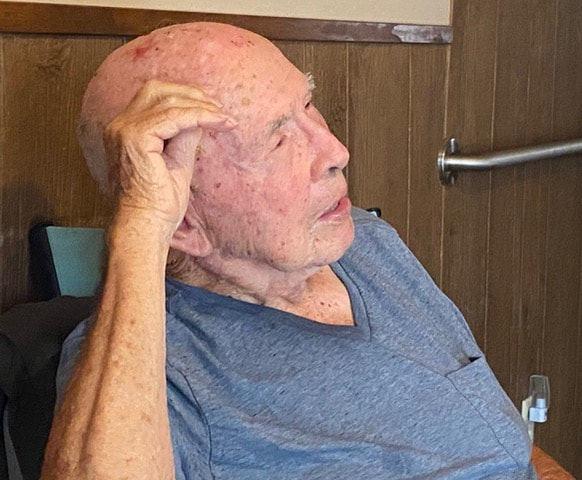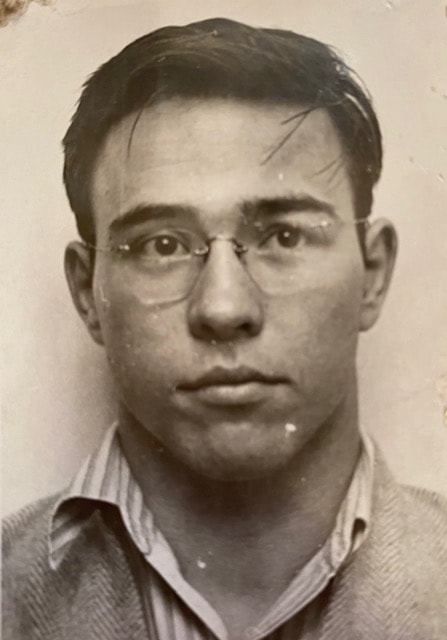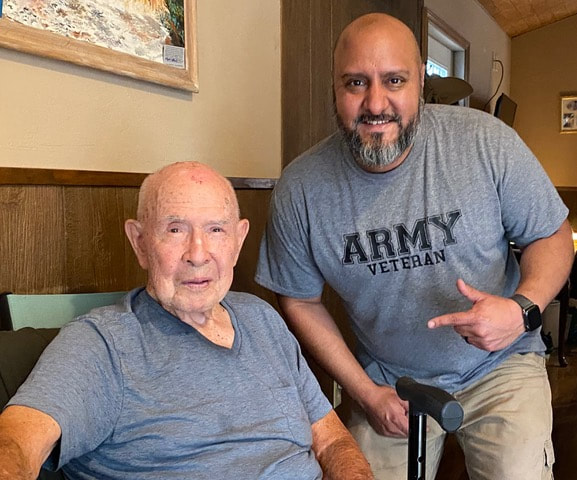Photos by Susan Junker; High School photo courtesy of Wallace Snyder
July 14, 2023
You’re in the Army Now!
By Susan Junker
Special to the Prophet
“You might have been a banker’s son. You might have pushed a plow. It makes no difference what you were. You’re in the Army now… for 21 dollars a day, once a month…” sang Wallace “Wally” Snyder, a local veteran of World War II, shortly before July 4th in his home just outside Bandera. At 99 years young, and having spent decades living and working at the GE plant in Fort Wayne, Indiana, humbly shared that he just “did his part” during World War II in the Army.
For Wally, “doing his part” meant participating in four campaigns as part of General George Patton’s Third Army: Northern France, Ardennes, Rhineland, and Central Europe. Snyder’s 404th Field Artillery Group was part of the XII Corps troops in the Third Army. The Northern France campaign included Operation Overlord: the Battle of Normandy, beginning with D-Day landings on June 6, 1944. The Command Post of the 404th was established at Utah Beach by mid-August 1944. Within days of Wally’s arrival, Paris was liberated and he was a witness to the jubilation in the streets there. The Ardennes campaign, better known as the Battle of the Bulge began in mid-December and was officially won Jan. 25, 1945. The Rhineland campaign was a series of offensive operations to clear the area west of the Rhine River and cross it. The final campaign in Western Europe, from March to May 1945, ended with dividing Germany in two.
When Patton was required to slow down and move south, Snyder’s outfit was reassigned to the X Corps. He earned the American Theatre Ribbon, the AME Theatre Ribbon with four bronze stars for each campaign, the World War II Victory Medal, and the Good Conduct Medal. By the time he returned to the United States in the summer of 1945, he had served in France, Luxembourg, Germany, and Czechoslovakia.
As the youngest of three brothers, Wally joined the Army first, as they already had families. He initially wanted to join the Navy, but they turned him down because he wore glasses.
“I have never been so glad to be rejected,” Wally shared. “I got sick just boarding that ship to Europe and was sick the whole trip.”
He first stepped foot in Texas after his basic training at Camp Perry, Ohio. Camp Bowie, near Brownwood, was his next training stop as a wireman. Camp Bowie encompassed more than 120,000 acres and trained over a quarter million soldiers. He also trained at Camp Hood, Texas and participated in the 1943 Louisiana Maneuvers. Camp Hood memories involve a lot of marching: 16-mile road marches in four hours and 25 miles in eight. Wally didn’t mind marching or leading others in formation, either. This was all a very long way from Indiana: a place he’d known since birth in 1924.
His service spanned nearly three years, from May 1943 through January 1946. Although trained as a wireman, he spent nearly all his time as a driver for officers of all ranks. Wiremen would “run wire” for the headquarters telephones, then return to wait for the call that they’d been broken. Wally recalls his best friends and fellow drivers: one from GE and Ft. Wayne who he enlisted with, and a great guy from Kentucky. They spent time together often after the war despite that Kentucky fellow making a surprise move that caused Snyder to somersault right out of the jeep! He doesn’t remember running out of fuel or having major mechanical breakdowns, but he certainly recalls seeing General Patton once, and one occasion when a loose grenade with an even looser pin was rolling around in the back of his jeep! Driver Snyder was issued the M1 .30 caliber carbine, a new compact weapon to equip support troops (e.g. radiomen, artillery, lineman, etc. He never learned where that grenade came from: certainly not his.
Corporal (Technical Sergeant Fifth Grade) Snyder rarely had to pull latrine or KP (Kitchen Police) duty as he had to be ready 24/7 to drive. News from home was sometimes rare, as the Corps Headquarters moved nearly 50 times in 8 months. Packages from home were always welcome, even if the cookies always smelled and tasted like the soap they were shipped with. Wally never understood why his sister thought he needed soap.
“I just did what I was told. I was raised that way. I just always tried to do my best. I didn’t know another way.”
This is how Wally Snyder describes his time in the Army and the character-building his parents provided. He always appreciated meeting people from around the country and the world while in the military. Being assigned to the Corps troops meant very few C-ration meals and only a short time in tents and foxholes. Most meals were in the mess hall, fuel from the motor pool, and sleeping in buildings. The observations and stories from the infantry and armor units the artillery supported made him even more grateful to be a driver. Wally does remember the stories of leadership from those units like Captain “Fearless Farley.”
Victory in Europe Day was celebrated May 8, 1945, to mark the surrender of Nazi Germany to the Allied Powers and the end of World War II in Europe. If the war had not ended then, the 404th Field Artillery and Snyder were destined for Japan. Fortunately, Klatovy and Asch, Czechoslovakia, was home for just a few days while ASR (Adjusted Service Rating) Scores were tabulated. This point system was designed to return troops back to the U.S. based on the length of time served, family status, and honors received in battle. With a score of 60 points, Corporal Synder was on his way home in a few days. Yet another unremarkable ocean voyage from Marseilles “past a ‘big rock’ and the Azores,” his only memories except for perpetual seasickness.
“Home” meant Fort Wayne, Indiana, family, and marriage to his high school sweetheart, Margaret. They raised one son, Stuart, there. The GE plant production was booming and Wally was much needed there. Margaret was also employed and soon convinced him to follow her work opportunity to Miami, Florida. In addition to his interest in history and desire to continue supervising factory work, he dove into fishing.
“That’s freshwater fishing, like the largest lake in Florida, Lake Okeechobee,” he emphasized.
Wally never had a strong desire for overseas travel after World War II, but enjoyed travel within the U.S. He quit driving a few years ago at age 97 and enjoys living at Misty Haven. With the loss of his wife, he returned to Texas to live near his son.
“I don’t mind the Texas heat. I spent years in the factory making magnet wire,” said the sage veteran. “Now that is hot.”
And he still remembers all the words to that song: “You’ll have a lot of fun and plenty of training For 21 dollars a day, once a month. You won’t have time to even think of complaining. For 21 dollars a day, once a month. So make the best of everything. And you’ll be treated right…”. We salute the service of Wallace “Wally” Snyder, one of our humblest and greatest.
For Wally, “doing his part” meant participating in four campaigns as part of General George Patton’s Third Army: Northern France, Ardennes, Rhineland, and Central Europe. Snyder’s 404th Field Artillery Group was part of the XII Corps troops in the Third Army. The Northern France campaign included Operation Overlord: the Battle of Normandy, beginning with D-Day landings on June 6, 1944. The Command Post of the 404th was established at Utah Beach by mid-August 1944. Within days of Wally’s arrival, Paris was liberated and he was a witness to the jubilation in the streets there. The Ardennes campaign, better known as the Battle of the Bulge began in mid-December and was officially won Jan. 25, 1945. The Rhineland campaign was a series of offensive operations to clear the area west of the Rhine River and cross it. The final campaign in Western Europe, from March to May 1945, ended with dividing Germany in two.
When Patton was required to slow down and move south, Snyder’s outfit was reassigned to the X Corps. He earned the American Theatre Ribbon, the AME Theatre Ribbon with four bronze stars for each campaign, the World War II Victory Medal, and the Good Conduct Medal. By the time he returned to the United States in the summer of 1945, he had served in France, Luxembourg, Germany, and Czechoslovakia.
As the youngest of three brothers, Wally joined the Army first, as they already had families. He initially wanted to join the Navy, but they turned him down because he wore glasses.
“I have never been so glad to be rejected,” Wally shared. “I got sick just boarding that ship to Europe and was sick the whole trip.”
He first stepped foot in Texas after his basic training at Camp Perry, Ohio. Camp Bowie, near Brownwood, was his next training stop as a wireman. Camp Bowie encompassed more than 120,000 acres and trained over a quarter million soldiers. He also trained at Camp Hood, Texas and participated in the 1943 Louisiana Maneuvers. Camp Hood memories involve a lot of marching: 16-mile road marches in four hours and 25 miles in eight. Wally didn’t mind marching or leading others in formation, either. This was all a very long way from Indiana: a place he’d known since birth in 1924.
His service spanned nearly three years, from May 1943 through January 1946. Although trained as a wireman, he spent nearly all his time as a driver for officers of all ranks. Wiremen would “run wire” for the headquarters telephones, then return to wait for the call that they’d been broken. Wally recalls his best friends and fellow drivers: one from GE and Ft. Wayne who he enlisted with, and a great guy from Kentucky. They spent time together often after the war despite that Kentucky fellow making a surprise move that caused Snyder to somersault right out of the jeep! He doesn’t remember running out of fuel or having major mechanical breakdowns, but he certainly recalls seeing General Patton once, and one occasion when a loose grenade with an even looser pin was rolling around in the back of his jeep! Driver Snyder was issued the M1 .30 caliber carbine, a new compact weapon to equip support troops (e.g. radiomen, artillery, lineman, etc. He never learned where that grenade came from: certainly not his.
Corporal (Technical Sergeant Fifth Grade) Snyder rarely had to pull latrine or KP (Kitchen Police) duty as he had to be ready 24/7 to drive. News from home was sometimes rare, as the Corps Headquarters moved nearly 50 times in 8 months. Packages from home were always welcome, even if the cookies always smelled and tasted like the soap they were shipped with. Wally never understood why his sister thought he needed soap.
“I just did what I was told. I was raised that way. I just always tried to do my best. I didn’t know another way.”
This is how Wally Snyder describes his time in the Army and the character-building his parents provided. He always appreciated meeting people from around the country and the world while in the military. Being assigned to the Corps troops meant very few C-ration meals and only a short time in tents and foxholes. Most meals were in the mess hall, fuel from the motor pool, and sleeping in buildings. The observations and stories from the infantry and armor units the artillery supported made him even more grateful to be a driver. Wally does remember the stories of leadership from those units like Captain “Fearless Farley.”
Victory in Europe Day was celebrated May 8, 1945, to mark the surrender of Nazi Germany to the Allied Powers and the end of World War II in Europe. If the war had not ended then, the 404th Field Artillery and Snyder were destined for Japan. Fortunately, Klatovy and Asch, Czechoslovakia, was home for just a few days while ASR (Adjusted Service Rating) Scores were tabulated. This point system was designed to return troops back to the U.S. based on the length of time served, family status, and honors received in battle. With a score of 60 points, Corporal Synder was on his way home in a few days. Yet another unremarkable ocean voyage from Marseilles “past a ‘big rock’ and the Azores,” his only memories except for perpetual seasickness.
“Home” meant Fort Wayne, Indiana, family, and marriage to his high school sweetheart, Margaret. They raised one son, Stuart, there. The GE plant production was booming and Wally was much needed there. Margaret was also employed and soon convinced him to follow her work opportunity to Miami, Florida. In addition to his interest in history and desire to continue supervising factory work, he dove into fishing.
“That’s freshwater fishing, like the largest lake in Florida, Lake Okeechobee,” he emphasized.
Wally never had a strong desire for overseas travel after World War II, but enjoyed travel within the U.S. He quit driving a few years ago at age 97 and enjoys living at Misty Haven. With the loss of his wife, he returned to Texas to live near his son.
“I don’t mind the Texas heat. I spent years in the factory making magnet wire,” said the sage veteran. “Now that is hot.”
And he still remembers all the words to that song: “You’ll have a lot of fun and plenty of training For 21 dollars a day, once a month. You won’t have time to even think of complaining. For 21 dollars a day, once a month. So make the best of everything. And you’ll be treated right…”. We salute the service of Wallace “Wally” Snyder, one of our humblest and greatest.




